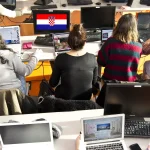November 25, 2023 – The pilot study Croatia’s (hidden) Potential – Highly Skilled, Young Remigrants as Agents of Change was presented on Thursday evening, supported by the Konrad Adenauer Foundation.
As 24Sata writes, the focus of this study was the transnational mobility and migration of Croatian millennials – young people born between 1981 and 1996 who today are between the ages of 27 and 42, the youngest overlapping with Generation Z born from 1997 onwards. The main interest of this study is to better understand what motivates highly qualified young Croatian citizens who left for further education, work experience and their professional career to return to Croatia.
Instead of the traditional promotion of study results, they decided to present it through a panel discussion.
“Experiences are something that cannot be bought, life in England as well as studying at Oxford were excellent and useful, but most of us returned for the same reasons. The family is at home, Croatia is safe and you can live well”, said Ana Budimir, who returned to Croatia in 2019 and took a job at the World Bank. She graduated from political science and economic studies in Zagreb, and went on for her postgraduate studies in international development in Oxford.
“Living abroad broadened my horizons and brought me into contact with people of different cultures and tolerance. I believe that the Croatian education system lacks intellectual stimulation, stimulation of critical and original thinking, and appreciation of international experience”, she concludes.
Lawyer Ivan Luetić, one of the interviewees, can agree on the reason for returning to Croatia.
“I studied at Harvard, then at Cambridge University, and stayed to work in London for a while. I returned to Zagreb primarily because of my obligation to society, to ‘return’ the acquired knowledge. At the same time, there is no ‘grandparent babysitting service’ option out there”, laughs Luetić, who is aware of how much family support means.
“Studying abroad made me aware of what is missing in our education system. I see the need to encourage this joy of learning. The informal approach of the professors at Harvard decisively strengthened my self-confidence”, concludes Luetić.
The pilot study was led by Caroline Hornestein Tomić from the Ivo Pilar Institute, Dora Bagić, and Maja Kurilić from Znanje na djelu, and was supported by the Konrad Adenauer Foundation, the Ivo Pilar Institute and Znanje na djelu.










